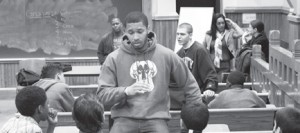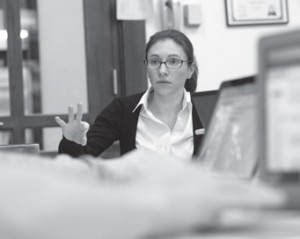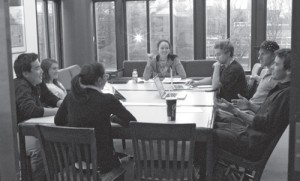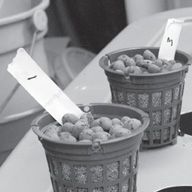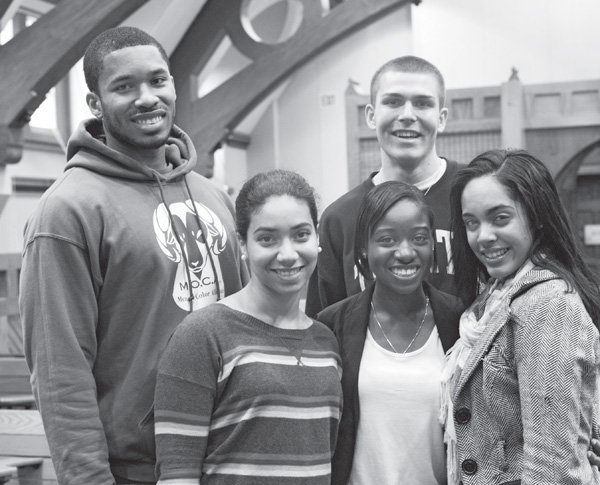
SWAG team members Mark Richards ’15, Lisbeimy Chavez ’13, Taniqua Huguley ’15, Peter Ganem ’15, and Ambar Paulino ’15
by Rhea Hirshman
Ambar Paulino ’15 wanted to offer Hartford’s middle and high school students the kind of college and career guidance she didn’t have when attending school in her Harlem neighborhood. “Throughout my high school career I missed out on important opportunities and information,” she says—“mainly because the adults who were a part of the process weren’t fully able to connect with us as high schoolers.”
Her solution? Becoming involved this year with SWAG—Students Who Achieve Greatness—one component of a campuswide umbrella program called Trinity College Without Borders (TCWB). SWAG connects area high school students to Trinity resources, students, and faculty who provide mentoring, advising, and college planning. The students on the SWAG team support high schoolers in the college choice and application process—which can seem particularly daunting to first-generation college students—and in demystifying college life itself.
Coming from a different sort of experience with mentoring, Lisbeimy Chavez ’13, a founding member of SWAG, knew that she wanted to work with youth when she joined TCWB during her sophomore year. “I have always mentored,” says the economics and anthropology major, “because, as an immigrant, I was an ESL student who needed a lot of help. I was lucky to have a great mentor in elementary school who helped me learn to read—an essential skill that has helped me get where am.” She notes that, initially, SWAG was conceived as an elementary school reading program, but the students turned to college mentoring when they realized reading programs already existed in local schools.
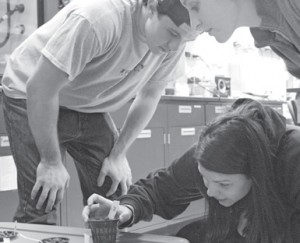
Mike Mancini ’14, Sarah Whitham ’14, and Hannah Brickley ’14 with the hydroponic system for cherry tomatoes
From Trinity’s own Hartford neighborhood to a village on the eastern slope of Tanzania’s Mount Kilimanjaro, TCWB employs student initiative and expertise to help communities develop their capacities to meet human needs. With students eager to participate in an experiential learning program and strong administrative support from President Jones and then-Dean of the Faculty Rena Fraden, TCWB was launched in 2010 by Emilie Dressaire, assistant professor of engineering.
Described by Dressaire, who continues to oversee the program, as “a cross between an
independent study and a club,” TCWB holds weekly meetings, requires writing assignments, and offers students half an academic credit for each semester of participation. But, Dressaire notes, the TCWB students share her passion for community
work, the nonprofit world, and influencing public policy. “Volunteering is something I would do one way or another,” she says. “Through TCWB, my own efforts have a greater impact since I’m working with enthusiastic young people who have shared interests.”
In its current iteration, TCWB is supporting three projects: SWAG, which, in addition to the
mentoring program, offers Think Pink for middle-school girls to address their daily challenges and concerns; a community garden; and an initiative to improve sanitation in the Tanzanian village of Marangu.
Engineers across the ocean
With an engineer at its helm and in a school with a strong undergraduate engineering program, TCWB is ideally situated to include an engineering initiative. The Tanzania project—building a sanitation system for the Ngaruma Parish Preschool—is being undertaken under the auspices of Trinity College Engineers Without Borders (TCEWB), which applied for and was granted recognition as a chapter of Engineers Without Borders (EWB). EWB is a national organization whose mission is to support community-driven development programs worldwide.
Tarah Sullivan ’13, a mechanical engineering major, was the driving force behind the
certification of TCEWB as an EWB chapter (“I can’t count the number of hours that Tarah has spent on this project,” Dressaire says). Sullivan explains that, once a chapter is approved for membership in EWB, it is assigned a liaison at EWB national headquarters, and a match is suggested between the chapter and a community that has applied through a local nongovernmental organization (NGO) to EWB for project assistance.
After months of studying, planning, and fundraising, TCEWB will travel to Tanzania this summer to begin the on-site work: investigating the current sanitation situation, testing the environment, and developing a relationship with the community. Including the assessment, implementation, and monitoring, the project is planned to take five years. The Trinity group is being assisted through EWB by professional mentors—engineers, hydrologists, and public health experts.
Providing the infrastructure is only part of meeting the village’s needs. “While we’re working with the community on building ‘kid-friendly’ latrines that don’t require adult assistance,” Sullivan says, “we’ll be helping develop the education and site-maintenance programs to
ensure good hygiene and continuous, successful use of the facilities.” TCEWB will be working with the NGO, teachers, and local leaders to integrate technical assistance about hygiene and maintenance with existing beliefs and practices. “While this project will immediately help the children of the Ngaruma school,” she says, “it also has the potential to strengthen the community as a whole.”
Gardening at home
Back at home in Hartford, another group of TCWB members has been working since 2011 to create a self-sustaining community garden, which had its first growing season last summer. Food “deserts” and food insecurity are pressing issues in urban areas, whose residents often find themselves without affordable, healthy food in easily accessible locations. Nearly one-third of Hartford residents live below the federal poverty level. The city has only one supermarket, while just a third of its residents own cars.
The garden, built last spring by Trinity students and local residents, has 20 raised plots on Broad Street, near the Trinfo. Café. “We put posters around the neighborhood, students knocked on doors, and word of mouth spread,” says Dressaire. The beds were completed in one day. Plots were assigned to families on a first-come, first-served basis. The seeds, donated by the Knox Parks Foundation, produced everything from tomatoes to watermelons. With most of the students away during the summer, the garden was overseen last year with help from SOS (Summer of Solutions) Hartford. This summer, the Knox Parks Foundation will step in.
“Our plan is to continue partnering with the Knox Parks Foundation to secure the future of the garden,” Dressaire says. “We also want to run programs all year, teaching kids about healthy eating.” Dressaire and the students in the project are building a hydroponic (indoor) system in her research lab; the system will allow for year-round food production and education programs.
Although it started within the Engineering Department, Dressaire says that TCWB attracts
students from a range of majors and backgrounds. “All the students are energetic and enthusiastic. Some projects have lost steam and disappeared; others have been added as students have come in with different concerns and experiences. Sometimes I think I’m too tired or pre-occupied with other tasks to go to a group’s meeting. Then I go, and I leave with a whole new reservoir of energy.”

